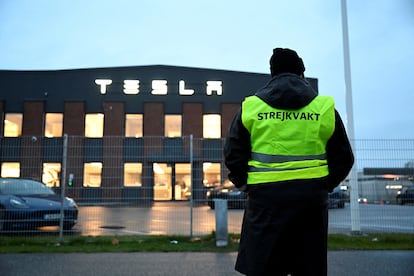Tesla sues Swedish agency as striking workers stop delivering license plates for its new vehicles
The Swedish workers are demanding that the carmaker sign a collective bargaining agreement, which most employees in Sweden have

Tesla on Monday filed a lawsuit against the Swedish state via Sweden’s Transport Agency as striking postal workers in the Scandinavian country halted the delivery of license plates of new vehicles manufactured by the Texas-based automaker.
Tesla is non-unionized globally, but the Swedish workers are demanding that the carmaker sign a collective bargaining agreement, which most employees in Sweden have. Tesla has no manufacturing plant in Sweden, but has several service centers.
Tesla said it was suing “the Swedish state through the Swedish Transport Agency” because not accessing the registration plates “constitutes an unlawful discriminatory attack directed at Tesla.”
Mikael Andersson, a press spokesperson for the agency, told The Associated Press in an email that “we at the Swedish Transport Agency do not share this view” that the agency was blocking the distribution of license plates. “Therefore Tesla has decided to have the issue tested in court, which is their right.”
“We have not yet seen the lawsuit and it is therefore difficult for us to give any direct comments. We need to look at the lawsuit and Tesla’s reasoning in it,” Andersson said.
According to the lawsuit obtained by The Associated Press, Tesla demands that the district court fine the agency 1 million kronor ($95,383) to “oblige” the Swedish Transport Agency to allow Tesla “retrieve license plates” within three days from notification of the district court’s decision.
The lawsuit was handed in on Monday. Tesla said that the agency has “a constitutional obligation to provide license plates to vehicle owners.”
The fact that the license plates are withheld “cannot be described in any other way than as a unique attack on a company operating in Sweden.”
The lawsuit argues that should the agency “not fulfill its constitutional obligation,” it “obstructs the applicant’s right.”
The trade union ST whose members work for the postal and delivery service PostNord, said that they were blocking the delivery of mail and packages to Tesla in accordance with the rules of the Swedish labor market.
By going to court, Tesla, “shows that they do not accept the rules that prevail” in Sweden, Åsa Erba Stenhammar of the ST trade union said.
On Oct. 27, 130 members of the powerful metalworkers’ union IF Metall walked out at seven workshops across the country where the popular electric cars are serviced, demanding a collective bargaining agreement.
Swedish mechanics stopped servicing Tesla cars and several unions, including postal workers, have joined in a wave of sympathy with IF Metall’s demands. Dockworkers at Sweden’s four largest ports also stopped the delivery of Tesla vehicles to put more pressure on the automaker.
Last week, Tesla’s CEO Elon Musk wrote on X, the social media platform formerly known as Twitter, which he owns, that it was “insane” that Swedish postal workers were refusing to deliver license plates for new vehicles.
IF Metall earlier said that Tesla Sweden has “refused to sign a collective agreement and violates basic principles in the Swedish labor market.” It called such agreements “the backbone of the Swedish model.”
The union also asked consumers for their understanding, saying, “We are doing this for the sake of our members, to ensure that they have safe working conditions.”
In the lawsuit, Tesla demanded the district court ensure the Swedish Transport Agency delivered its license plates.
Sign up for our weekly newsletter to get more English-language news coverage from EL PAÍS USA Edition
Tu suscripción se está usando en otro dispositivo
¿Quieres añadir otro usuario a tu suscripción?
Si continúas leyendo en este dispositivo, no se podrá leer en el otro.
FlechaTu suscripción se está usando en otro dispositivo y solo puedes acceder a EL PAÍS desde un dispositivo a la vez.
Si quieres compartir tu cuenta, cambia tu suscripción a la modalidad Premium, así podrás añadir otro usuario. Cada uno accederá con su propia cuenta de email, lo que os permitirá personalizar vuestra experiencia en EL PAÍS.
¿Tienes una suscripción de empresa? Accede aquí para contratar más cuentas.
En el caso de no saber quién está usando tu cuenta, te recomendamos cambiar tu contraseña aquí.
Si decides continuar compartiendo tu cuenta, este mensaje se mostrará en tu dispositivo y en el de la otra persona que está usando tu cuenta de forma indefinida, afectando a tu experiencia de lectura. Puedes consultar aquí los términos y condiciones de la suscripción digital.








































